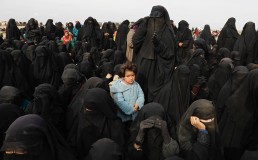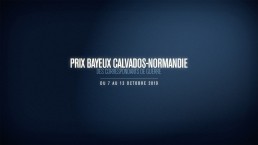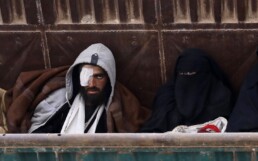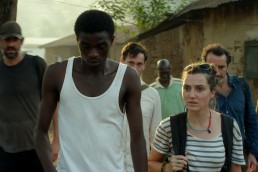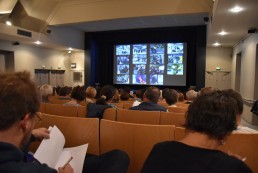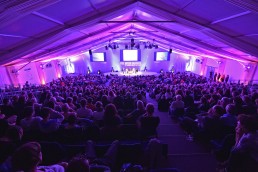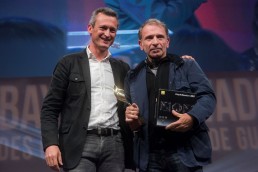Ed Vulliamy, Chair of the jury for the 27th edition
27 avril 2020News,Non classé @en
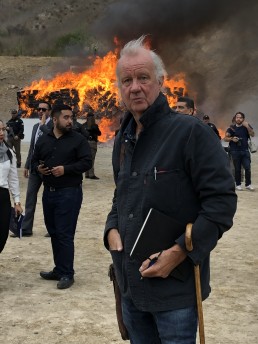
© Jorge Fregoso – Tijuana, Octobre 2019
“I don’t see myself as a war reporter. I see myself as an anti-war reporter”
“I don’t see myself as a war reporter. I see myself as an anti-war reporter”
At the age of almost 66 Ed Vulliamy belongs to what journalists tend to refer to as the “Sarajevo generation”. He covered the conflicts of the 1990s in Slovenia, Croatia and Bosnia, and in Iraq, but it was by no means a foregone conclusion that he would enter the singular profession of war correspondent.
“I hate war: my father was a pacifist and his mother, Irish and a fierce republican who had lived through the war of independence, was too”, he explains. “But war keeps coming to me.” As a student of politics and philosophy at the university of Oxford, the young Ed was deeply affected by the events taking place in Northern Ireland. The Troubles provided a natural subject for his thesis, which became his first “war report”. After leaving university he joined the team of World in Action, the investigative current affairs programme produced by English regional channel ITV Granada (formerly Granada TV), and spent eight years covering the conflict in Northern Ireland for the programme. His first area of specialisation also led to his first awards, with one of his many documentaries earning him the Royal Television Society award in 1985. He left to go to Italy, to investigate and cover organised crime in Europe’s famous “Boot”. His employer the Guardian, with whom he would continue to work throughout his whole career, asked him to “keep an eye on Yugoslavia” from Italy. In the end Ed would keep more than an eye on the Balkans: between 1991 and 1995 he spent most of his time in this region racked by successive conflicts. The journalist who had “become a war reporter by accident” received numerous awards for his work in this perilous zone. Having witnessed some of the worst atrocities, Ed Vulliamy would provide testimony in 2006 at the International Criminal Court in The Hague, in Holland, corroborated by footage filmed in the concentration camps for his documentary Omarska’s Survivors: Bosnia 1992. Facing him in the dock was Slobodan Prajlak, the man who had received him at the Dretelj camp 13 years earlier. At that moment the “accidental“ war reporter became the first journalist since the Nuremberg trials to testify in a war crimes tribunal.
“I don’t really go to war, war comes to me”
“I don’t really go to war, war comes to me”
At the end of the 1990s it was “Ciao, Italia!” Ed left for the United States where The Observer, sister title to The Guardian, had asked him to be its U.S. correspondent. He had already covered many topics in America for the British Sunday paper during the 1990s. This time he was able to return to his speciality, investigating organised crime and drug trafficking along the U.S.-Mexican border. The result was the book Amexia, War Along the Borderline, which received the prestigious Ryszard Kapuscinski Award in 2013. In 2001, when he was based in New York, he found himself in the front line when the attacks on the World Trade Center took place: once again “war came to [him]”. He later covered the conflict in Iraq for The Observer but had found himself “censored or ignored” when he tried to publish articles bringing to light the false information being propagated prior to the war and the non-existence of weapons of mass destruction. His determination and desire to reveal the truth are portrayed in Gavin Hood’s 2019 film Official Secrets, where he is played by the Welsh actor Rhys Ifans.
“To be a good journalist and especially a good war reporter, you have to be a little mad”
“To be a good journalist and especially a good war reporter, you have to be a little mad”
When asked how a journalist who has become a war correspondent by accident can be so committed and driven, Ed Vulliamy turns the question round: “What else to do?” He adds, with modesty, “It is our job to write or film the truth, however uncomfortable that is. In fact I think that’s how we measure professionalism in our work: by doing the best we can.” Measuring professionalism: that’s the big challenge in his upcoming role as chair of the international jury of the 27th Bayeux award for war correspondents. The journalist – who also writes articles and books on such diverse topics as football, painting and music – admits to feeling nervous: “I hope I’ll be up to it. It’s the Oscars of war reporting! It’s a huge responsibility and I’m honoured”.
« I think our definition of war may change as the 21st Century proceeds.
The wars my brave and amazing colleagues have mostly covered are like the wars of history, dragged into our time.
But what are we to make of new kinds of war in, say, Mexico, where the death toll is three times that of Bosnia, and the number of disappeared 50 per cent higher than all the Balkan wars, 1991-9? Yet in this war, which has killed more journalists than any other – people go to market, to school, to Mass; the football league functions well, the universities are good – war in apparent ‘peacetime’. What are we to call the gangland battlefields of El Salvador and Honduras, and refugees from ‘drugs wars’?
Academics use the term ‘slow violence’ to describe many of the world’s conflicts. Young people – journalists, readers and viewers – will include refugees and migration from climate crisis, and future wars over water and resources, as wars as much as any other – part of that time-long war between humankind and nature that will dominate coming generations. What are we to call the violent obliteration of the last indigenous existences, and assaults on indigenous lands and minorities? Journalists are being killed for reporting these stories too.
Where does systematic violence against women fit in to our definitions of war: femicidio in the Americas, the cult of gang rape in India?
That “war between the man and the woman*’ as Leonard Cohen called it!
We cannot call all violence ‘war’ – that would be ridiculous – and focus on warfare is what raises Bayeux to a level of honour above all other awards for journalism.
But I do think young people will want us to be less conventional with regard to what we call ‘War’, and, logically, war reporting. » — Ed Vulliamy
1954 ❱ Ed Vulliamy was born in Notting Hill, London
1979 ❱ Joined English regional channel ITV Granada (formerly Granada TV)
1985 ❱ Won the RTS Journalism Award for his documentary on Ireland
1986 ❱ Joined British newspaper The Guardian
1991 ❱ Covered the war in Iraq
1991-1995 ❱ Covered the wars in the Balkans
1992 ❱ Granada Television’s What the Papers Say Foreign Correspondent of the Year
1992 ❱ British Press Awards International Reporter of the Year
1992 ❱ Amnesty International Media Award
1994 ❱ James Cameron Award
1997 ❱ British Press Awards International Reporter of the Year
2001 ❱ Covered the 11 September attacks in New York
2003-2006 ❱ Covered the war in Iraq
2006 ❱ Became the first reporter since the Nuremberg trials to testify before the International Criminal Court in the Hague
2013 ❱ Won the Ryszard Kapuscinski Award for his book Amexica: War Along The Borderline
2015 ❱ Publication of the book Everything Is Happening: Journey into a painting on the masterpiece by Velázquez. He had completed the book for his friend, author Michael Jacobs.
2016 ❱ Nominated for the Ryszard Kapuscinski Award for his book The War Is Dead, Long Live the War, Bosnia: The Reckoning.
2018 ❱ Publication of the book When words fail: a life with music, war and peace (Louder Than Bombs in the United States)
2019 ❱ Was played by actor Rhys Ifans in Gavin Hood’s film film Official Secrets
2020 ❱ Made an Honorary Fellow of Goldsmiths College, London
2020 ❱ Second, updated edition of the book Amexica: War Along he Borderline, ten years after its first publication
Call for candidates
27 avril 2020News,Non classé @en
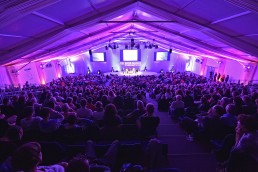
The Bayeux Calvados-Normandy award for war correspondents rewards reports about a conflict situation or its impact on civilians, or news stories involving the defence of freedom and democracy.
The report must have been made between 1 June 2019 and 31 May 2020. A €7,000 prize is awarded in each category.
The reports must be submitted to the following address by June 15th 2020: info@prixbayeux.org with a link to download the entry
The categories of media represented are: radio – photography – television (short and long formats) – written press and the young reporter prize (photo this year)
TEN PRIZES ARE AWARDED
Seven prizes awarded by the international jury
- Written Press Prize sponsored by the Calvados Department – €7,000
- Television Prize sponsored by Amnesty International- €7,000
- Radio Prize sponsored by the D-Day Landing Committee – €7,000
- Photo Prize sponsored by Nikon – €7,000
- Grand format Television Prize sponsored by the town of Bayeux – €7,000
- Young reporter Prize sponsored by Crédit Agricole Normandie – €3,000
- Video image prize sponsored by Arte, France 24 and France Télévisions – €3,000
Three special prizes
- The Ouest-France – Jean Marin Prize (written press) – €4,000
- The Public Prize (photo) sponsored by the Agence Française de Développement – €3,000
- The Normandy Region secondary School Students’ Prize (television) – €3,000
REGULATIONS
• The Young Reporter’s Award: in 2020: the category is photo. Since there is a different category according to the years, the presented story must have been realized between 1 June 2018 and 31 May 2020.
• Written press category: the application must be made up of an article or a series of 1 to 5 articles on the same subject.
• Television category: the length of the report must be between 1 minute 30 seconds and 6 minutes. The report submitted must be identical to the broadcast piece.
• Grand format television category: the length of the report must be between 6 and 30 minutes. The report submitted must be identical to the broadcast piece.
• Radio category: the length of the report must be between 1 minute and 6 minutes. The report submitted must be identical to the broadcast piece.
• Photo category: The application comprises a report made up of 8 to 15 photos.
Workshop Nikon – Le Manoir
27 avril 2020News,Non classé @en

With over a century of existence and by virtue of its values and commitment, supporting photojournalists is part of Nikon’s DNA.
In the framework of the Bayeux award for war correspondents, the brand offers to pay for 12 participants for the training "REPORT IN DANGEROUS ZONES" of the Manoir created by France Médias Monde.
In association with INA (the French national audiovisual archive) and with the support of Reporters without borders, the Manoir will soon have trained almost 360 reporters and information technicians and collaborates with many media like Le Monde newspaper, Arte, Canal + and the French public television channels, among others. The training provided by the Manoir is now recognised as the reference standard in its field.
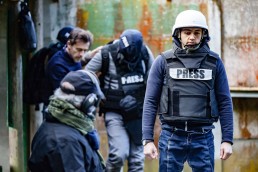
While it is obvious that research and information-sharing are essential, the safety of journalists on assignment has to be both the primary concern and the starting point in the editorial process.
Because the journalist is the principal player in his or her own safety, the Manoir provides specific training and methodologies given by journalists to journalists, and brings in leading experts in the fields of health, emergency rescue and psychology.
The effects of weapons, the dangers of mines and orientation skills are also taught by expert practitioners who are experienced in training news professionals.
By the end of the training course, the journalist situated in a danger zone is able to assess risks more accurately, to understand critical situations and to react more adroitly to accidents in the field.
By partnering with the Manoir, Nikon wants to support talented young photojournalists in the exercise of their profession by giving them the best possible training.
To apply, candidates must send their entry, including a CV, a motivation letter and one or more productions of a photo report produced in dangerous zones, to securite.academie@francemm.com before August 30, 2020.
Visual
27 avril 2020News,Non classé @en
The 2020 visual is a photo from the 2019 winning report. This photograph taken by Patrick Chauvel for Paris Match, was part of his report shot in Baghuz, Syria in March 2019.
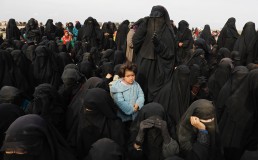
Caption: A little girl amid Jihadists’ wives assembled in the desert by the Kurds.
Patrick Chauvel
For over fifty years, Patrick Chauvel has photographed most of the conflicts around the world. He is one of the last of a generation of reporters who lived the Six Day War, Vietnam, Cambodia, Ireland, Iran, Lebanon, Panama, Afghanistan, Israel, Chechnya, Syria… His images have made the front page of the most prestigious media in the world. Author of numerous documentaries, he also wrote a book on the life of war reporter, success of bookstores: Rapporteur de guerre.
© Bayeux Award photo 2019 – Patrick Chauvel
2019 Bayeux Calvados-Normandy Award: The complete ceremony
4 décembre 2019News,Non classé @en
Watch the full ceremony here
26th edition of the Bayeux Calvados-Normandy Award: results
12 octobre 2019News,Non classé @en
More than forty war correspondents have gathered in Bayeux on October 11th and 12th to debate and award trophies in the following categories: photo, print, radio, television, grand format television, young reporter (print) and video image. Three honorary awards have been attributed: the Regional prize for students and trainees of Normandy (television), the Public’s Choice award (photo) and the Ouest-France – Jean Marin prize (print). Presided by Gary Knight, the international jury of the 26th edition of the Bayeux Calvados-Normandy Award for war correspondents has reached its verdict…
« In every category, the jury converged on a few stories, there wasn’t a lot of dispute. We had a really great conversation amongst the jury, interesting, lively and with very good humour. Plus it is wonderfull to see my colleagues and it is also great to know what they have to say about that work. We can challenge each other and I love having this conversations. It makes it all smarter.«
Gary Knight
PHOTO TROPHY – INTERNATIONAL JURY
AWARDED BY NIKON
1st Prize
Patrick CHAUVEL
Freelance for PARIS MATCH
Syrie, la fin de Baghouz
SYRIA
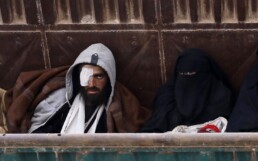
2nd Prize
Rodrigo ABD
ASSOCIATED PRESS
A caravan
MEXICO
3rd Prize
Andrew QUILTY
AGENCE VU
Quand la guerre rentre à la maison
AFGHANISTAN
TELEVISION TROPHY – INTERNATIONAL JURY
AWARDED BY AMNESTY INTERNATIONAL
1st Prize
Orla GUERIN, Lee DURANT and Nicola CAREEM
BBC NEWS
Yémen : un bus touché par une frappe aérienne
YEMEN
2nd Prize
John SUDWORTH and Wang XIQING
BBC NEWS
Les camps d’internement pour les musulmans en Chine
CHINA
3e Prix
Fausto BILOSLAVO
RETE 4
Guerre en Libye
LIBYA
PHOTO TROPHY – PUBLIC’S CHOICE AWARD
SPONSORED BY THE FRENCH DEVELOPMENT AGENCY (AFD)
1st Prize
Patrick CHAUVEL
Freelance for PARIS MATCH
Syrie, la fin de Baghouz
SYRIA

PRINT TROPHY – INTERNATIONAL JURY
AWARDED BY THE DEPARTMENT OF CALVADOS
1st Prize
Fritz SCHAAP
Der Spiegel
An epidemic and a war
DEMOCRATIC REPUBLIC OF CONGO (DRC)
2nd Prize
Wolfgang BAUER
Die Zeit
L’ordre
AFGHANISTAN
3rd Prize
Maggie MICHAEL
ASSOCIATED PRESS
Yémen, la sale guerre
YEMEN
RADIO TROPHY – INTERNATIONAL JURY
AWARDED BY THE D-DAY LANDING COMMITTEE
1st Prize
Sami BOUKHELIFA
RFI
Voyage au bout du califat
SYRIA
2nd Prize
Sophie PARMENTIER
France INTER
Françaises, mère et fille, dans une prison de Bagdad
IRAQ
3rd Prize
Matthieu MONDOLONI
France INFO
Kinan, l’enfant esclave de Daech
SYRIA-IRAQ
YOUNG REPORTER TROPHY (PRINT) – INTERNATIONAL JURY
AWARDED BY CRÉDIT AGRICOLE NORMANDIE
1st Prize
Wilson FACHE
L’ORIENT-LE JOUR / THE NATIONAL NEWSPAPER / VICE
Gaza, année noire
GAZA
GRAND FORMAT TELEVISION TROPHY – INTERNATIONAL JURY
AWARDED BY BAYEUX CITY
1st Prize
Clément GARGOULLAUD and Shafat FAROOQ
Babel Press for Arte Reportage
Cachemire : les visages de la colère
INDIA
VIDEO IMAGE TROPHY – INTERNATIONAL JURY
AWARDED BY ARTE, FRANCE 24, FRANCE TÉLÉVISIONS
1st Prize
Clément GARGOULLAUD
Babel Press for Arte Reportage
Cachemire : les visages de la colère
INDIA
PRINT TROPHY – OUEST-FRANCE – JEAN MARIN
1st Prize
Fritz SCHAAP
Der Spiegel
An epidemic and a war
DEMOCRATIC REPUBLIC OF CONGO (DRC)
TELEVISION TROPHY – REGIONAL PRIZE FOR STUDENTS AND TRAINEES OF NORMANDY
1st Prize
Leo RAMIREZ, Jesus OLARTE, Yorman MALDONADO, Carlos REYES, Natasha VAZQUEZ and Edinson ESTUPINAN
AFP TV
Venezuela: crisis at the border
VENEZUELA
Cinema evenings: last minute infos
The first two nights of the Bayeux Calvados-Normandy Award for war correspondents will take place in the Méliès with two cinema screenings. Guillaume de Fontenay, director of the film Sympathie pour le diable, Nina Meurisse, lead actress of the film Camille, Michaël Zumstein, photojournalist who participated in its realization and the mother of Camille Lepage have just confirmed their arrival in Bayeux.
Monday 7th October - 8.30 pm - Premiere of the movie Sympathie pour le diable
Inspired by real events, based on the account “Sympathy for the Devil” by Paul Marchand. Hiding his extreme sensitivity behind an armour of
sarcasm, vulnerable despite his bravado and strong despite his flaws, Paul Marchand established his reputation during the siege of Sarajevo in 1992-1993. An inveterate risk-taker, provocative and meticulous in recounting the horrors around him, he famously wrote messages to snipers on his car: “Don’t Waste your Bullet I’m Immortal” and “Morituri te Salutant”. But this is the story of his gradual revolt against the fate of ordinary people caught in a vice under a rain of shells, the apathy of the international community and the uncaring attitude of some of his colleagues for whom the war was just a “good subject” to be reporting on. This film is an immersion into what the profession of war correspondent is really like, marked by violence, atrocities and injustice.
The screening will be followed by an exchange with Guillaume de Fontenay, director.
Tuesday 8th October - 8.0 pm - Premiere of the movie Camille
Camille Lepage, a young photojournalist full of ideals, leaves for Central Africa to cover the impending civil war . What she sees there will change her destiny.
The screening will be followed by an exchange with Boris Lojkine, director, Nina Meurisse, lead actress, Michaël Zumstein, photojournalist and the mother of Camille Lepage.
Practical informations
Cinema Le Méliès
Admission (for each): 6,50 €
Public prize and awards night: registrations are open!
Interested persons should call the following indigo number: 0 825 014 400 (€ 0.15 incl. Tax / min)
Within the limit of available seats.
Public prize - Saturday, October 12 from 10am to 12pm
A jury will nominate its winner in the photo category. This public prize will be awarded during the awards night.
10am: vote of the jury sponsored for the 6th year by the French Development Agency
11am: feedback on the 2018 public award for Paula Bronstein's report on the Rohingya crisis.
Awards Night - Saturday, October 12 at 6:30 pm
This evening, presented by Nicolas Poincaré, will be an opportunity to take stock of the news of the past year. It will be punctuated by unpublished topics specially made for this meeting. The public will also discover the winning reports, in the presence of the jury and many journalists.
Gary Knight, President of the jury of the 26th edition
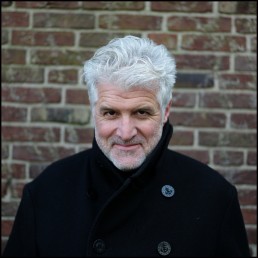
© Alizé Le Maoult
The president of our jury this year will be one of the most seasoned war photographers of our time. Gary Knight’s photos have been published by Newsweek, Time, The Sunday Times, The New York Times, Paris Match, Stern and National Geographic. His work has been exhibited all over the world and is included in the collections of several museums. Gary Knight is also co-founder and a director of the VII Agency.
Gary Knight began his photography career in the late 1980’s photographing the wars in Cambodia and Burma. He was a contract photographer for Newsweek in the 1990’s and 2000’s during which time he photographed the wars in Bosnia, Kosovo, Iraq, Afghanistan, Kashmir, Liberia, Congo and Israel Palestine.
Gary is co-founder and director of the VII Photo Agency. He is also the co-director of the VII Foundation and director and founder of the VII Academy. Gary is a member of the Board of Trustees of the Frontline Club, London; co-founder of The GroundTruth Project, Boston; founding director of the Program for Narrative & Documentary Practice at the Institute for Global Leadership at Tufts University; twice chair and president of the World Press Photo Award; was a Nieman Fellow at Harvard University in 2009; and a Logan Non Fiction Fellow at the Carey Institute in 2017.
« It is a great privilege to be invited to Chair the jury of the Bayeux Award for war correspondents this year and to honour the men and women who file dispatches and images from fields of conflict. It is especially poignant to do this at a time when our media are increasingly under attack by politicians and governments – even in countries where a free press is enshrined in the constitution. War reporting is a vital and essential function of journalism. It is critical to civil society, to our sense of justice and accountability and to basic human rights.
As the late Marie Colvin said in 2010, two years before she was killed in Homs: “The public have a right to know what our government, and our armed forces, are doing in our name. Our mission is to speak the truth to power. We send home that first rough draft of history. We can and do make a difference in exposing the horrors of war and especially the atrocities that befall civilians”. »
Gary Knight
Visual
The 2019 visual is a photo from the 2018 winning report. This photograph taken by Mahmud Hams from Agence France-Presse (AFP), was part of his report shot in Gaza between February and May 2018.
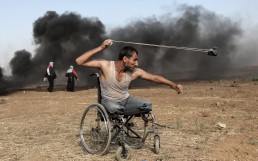
Caption: Palestinian Saber al-Ashkar, 29, hurls rocks during clashes with Israeli forces along the border with the Gaza strip, east of Gaza City, on May 11, 2018, as Palestinians demonstrate for the right to return to their historic homeland in what is now Israel.
Mahmud Hams
Mahmud Hams, 38, holds a degree from the Islamic University of Gaza in journalism and information. He joined Agence France-Presse in 2003 and covers day-to-day current affairs in the Gaza Strip and occasionally in Libya and Egypt. He has received many international awards including the Bayeux award in 2007 and 2018.
© Bayeux Award photo 2018 – Mahmud Hams / AFP
An exceptional occasion for school children
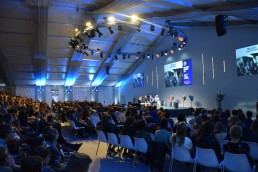
For the 26th edition the HCR - the United Nations Agency for refugees - and Ouest-France newspaper will be organising an outstanding event for middle and high school students in Normandy, “the HCR-Ouest-France Encounters”.
As partners of the Bayeux award the HCR and Ouest-France will be addressing school students and inviting them to meet refugees who will talk about their experiences of exile and the importance of international protection for those fleeing from war and persecution. In this age of instantaneous information, the HCR and Ouest-France aim to give young people a different understanding of the position of refugees in France and around the world.
Workshop Nikon – Le Manoir

In the framework of the Bayeux award for war correspondents, Nikon will be organising a workshop for talented young photojournalists, as it has done each year since 2013.This year, Nikon is joining forces with the Manoir Centre, which was set up in 2014 by France Médias Monde to provide training for journalists working in dangerous zones. In association with INA (the French national audiovisual archive) and with the support of Reporters Without Borders, the Manoir will soon have trained almost 300 journalists from a variety of backgrounds. The training course was designed for journalists working for France Médias Monde, but is open to all media and is training journalists from Le Monde newspaper, Arte, Canal + and the French public television channels, among others. The training provided by the Manoir is now recognised as the reference standard in its field.
While it is obvious that research and information-sharing are essential, the safety of journalists on assignment has to be both the primary concern and the starting point in the editorial process. Because the journalist is the principal player in his or her own safety, the Manoir provides specific training and methodologies given by journalists to journalists, and brings in leading experts in the fields of health, emergency rescue and psychology. The effects of weapons, the dangers of mines and orientation skills are also taught by expert practitioners who are experienced in training news professionals.
By the end of the training course, the journalist situated in a danger zone is able to assess risks more accurately, to understand critical situations and to react more adroitly to accidents in the field.
With over a century of existence and by virtue of its values and commitment, supporting photojournalists is part of Nikon’s DNA. In partnership with the Manoir, Nikon wants to support talented young photojournalists in the exercise of their profession by giving them the best possible training.
© GUILLAUME LOUYOT – FRANCE MEDIAS MONDE
New partners for the 26th edition
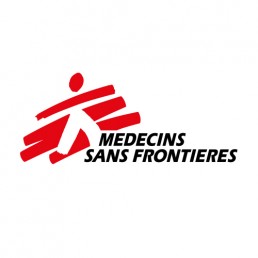
Médecins Sans Frontières
Doctors Without Borders is an international humanitarian medical organization which was set up in Paris in 1971 by doctors and journalists. MSF provides medical aid to populations whose lives or health are threatened, particularly in cases of armed conflicts but also when there are epidemics or natural disasters.
For almost 50 years the organization has been developing its work in the same regions as war correspondents, and shares the same aims – to raise awareness of and highlight the plight of populations suffering the consequences of conflict. From Afghanistan, Rwanda and the Balkans yesterday to Iraq, Central African Republic or Yemen today, MSF is there to treat the suffering and bear witness.
So it follows quite naturally that MSF has now become a partner of the Bayeux award for war correspondents.
Photography has played an important role in the history of MSF. War photographers and photojournalists have been working alongside humanitarian teams for years, capturing the immediacy of events with pictures that reflect personal stories. But behind the immediacy, their work also allows the background history of a region and the suffering of populations affected by conflict, natural disasters or disease to be revealed.
Crédit Agricole Normandie
Crédit Agricole Normandie is a co-operative bank and the leading financial institution in its region, with 748,000 clients. It offers the full range of expertise needed to meet the banking and insurance requirements of individuals, companies and local authorities.
As a player in both economic and social sectors Crédit Agricole Normandie is also involved in major structural projects in the region. As a leading bank it was therefore natural that it should be a partner of the Bayeux award for war correspondents through the Young Reporter award.
We are very proud to be associated with this internationally renowned event which has been enhancing the reputation of our region for more than 20 years. The Bayeux award sheds light on and helps us to decipher current affairs in an increasingly complex world by paying tribute to journalists - who carry out their profession at the risk of their lives - and who ensure the freedom and independence of information, which is fundamental to our democracies.
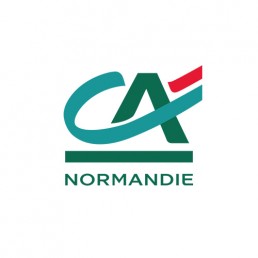

France Télévisions
France Télévisions was the leading audiovisual group in France in 2018 with an audience share of 28.4%, attracting 32 million people in France every day thanks to a rich and varied mix of programming.
In a world which is more and more complex and uncertain, information – which is at the core of France Télévisions’ mission – is an essential component in building a bond of trust with the audience.
14.5 million viewers keep up with current affairs through France Télévisions’ news programmes every day. The group provides the broadest range of factual programming in the French television landscape with more than 60 regular shows across the group’s channels – investigative current affairs magazines, political and debate shows, magazines devoted to social themes, the economy, Europe, international current affairs and culture.
France Télévisions is treating the fight against fake news and taking action to encourage media education as a priority: new formats have been created to scrutinise information that is circulating, such as “Faux et usage de faux” (“Forgery and falsification”), in the 8pm television news bulletin on France 2 and “ Vrai ou fake – l’envers de l’info” (“True or fake – behind the news”) on France Info channel 27, not forgetting the website “Vrai ou fake” (“True or fake”) on franceinfo.fr which brings together all the fact-checking modules provided by the main public service media.
Tribute to Yannis Behrakis
We are profoundly saddened to learn of the death of Yannis Behrakis. As winner of the Prix Bayeux in 2002 (Public prize for a report in Afghanistan) and 2016 (Nikon Photo prize and Public - French Development Agency prize for a report on refugees) he had moved everyone in the
audience at the 2016 award ceremony when he announced that he would donate his Public prize to Doctors Without Borders. Yannis Behrakis leaves us with the memory of a great professional and a man full of warmth and humanist spirit. All our thoughts are with his family and loved ones.
2018 Bayeux Calvados-Normandy Award: The complete ceremony
15 octobre 2018News,Non classé @en


